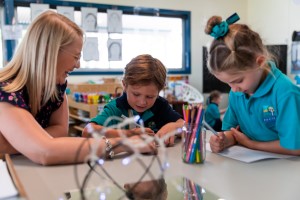Importance of Ongoing Feedback for Learners at Pacific
Importance of Ongoing Feedback for Learners at Pacific
 Ongoing feedback is crucial for our learners as it plays a significant role in their cognitive, emotional, and social development. Here are several reasons highlighting the importance of ongoing feedback for young learners:
Ongoing feedback is crucial for our learners as it plays a significant role in their cognitive, emotional, and social development. Here are several reasons highlighting the importance of ongoing feedback for young learners:
Supports Skill Development: Constructive feedback provides young learners with insights into their strengths and areas that need improvement. This helps them understand what they are doing well and where they can focus their efforts for growth. Whether it's academic skills, sports, arts, or any other activity, feedback guides their learning journey.
Builds Confidence: Positive feedback reinforces a young learner's self-esteem and confidence. When they receive recognition for their efforts and achievements, they are more likely to believe in their abilities and take on new challenges. This positivity fosters a growth mindset that encourages them to keep trying even when faced with difficulties.
Encourages Reflection: Feedback encourages young learners to reflect on their performance and actions. By analyzing feedback, they can identify areas of improvement and develop a deeper understanding of their learning process. This self-awareness contributes to enhanced critical thinking and problem-solving skills.
Clarifies Expectations: Clear feedback helps young learners understand what is expected of them. They can align their efforts with these expectations, leading to more focused and efficient learning. When expectations are well-defined, learners are less likely to feel overwhelmed or uncertain.
Promotes Goal Setting: Feedback aids in setting achievable goals. By understanding where they currently stand and where they need to improve, young learners can set realistic goals that serve as milestones for their progress. This sense of direction motivates them to work consistently towards their objectives.
Fosters Communication Skills: Receiving feedback teaches young learners how to listen, process information, and respond appropriately. This enhances their communication skills, helping them express their thoughts and ideas effectively, whether in academic settings or personal interactions.
Cultivates a Growth Mindset: Ongoing feedback encourages young learners to view challenges as opportunities for growth. When they learn to accept feedback positively, they are more likely to embrace setbacks as learning experiences and persist in the face of obstacles.
Strengthens Relationships: The process of giving and receiving feedback nurtures healthy relationships between young learners and their peers, teachers, mentors, and parents. Constructive feedback fosters trust and mutual understanding, creating an environment where learners feel comfortable seeking guidance and support.
Adapts Learning Strategies: Feedback allows young learners to adapt their learning strategies based on their progress. If a particular approach isn't yielding results, they can adjust their methods with the guidance of feedback, which promotes adaptable and flexible thinking.
Prepares for Real-World Situations: Learning to accept and utilize feedback is a valuable life skill. Young learners who become adept at receiving feedback gracefully are better prepared for professional and personal challenges in the future, where feedback is a common component of growth and success.
We are currently providing student feedback – Year Prep to Year 2 on Seesaw and Year 4 and 5 on Nav.
Enjoy celebrating your child’s learning.
Mrs Sue Zweck, Head of Teaching and Learning K-5
